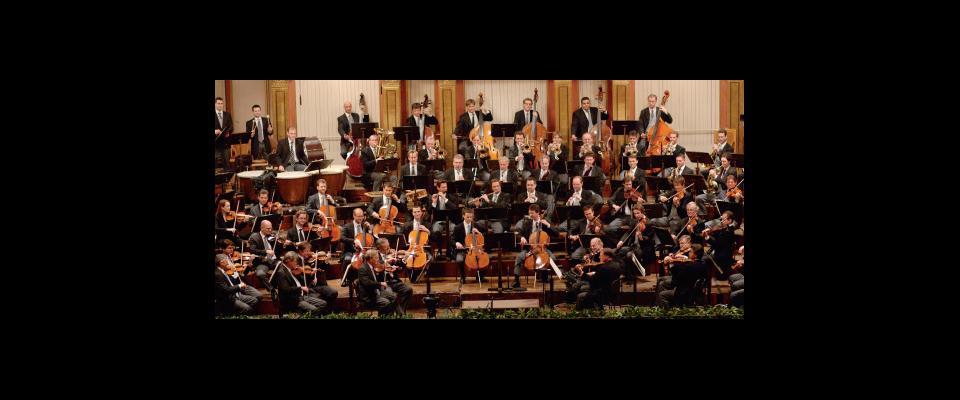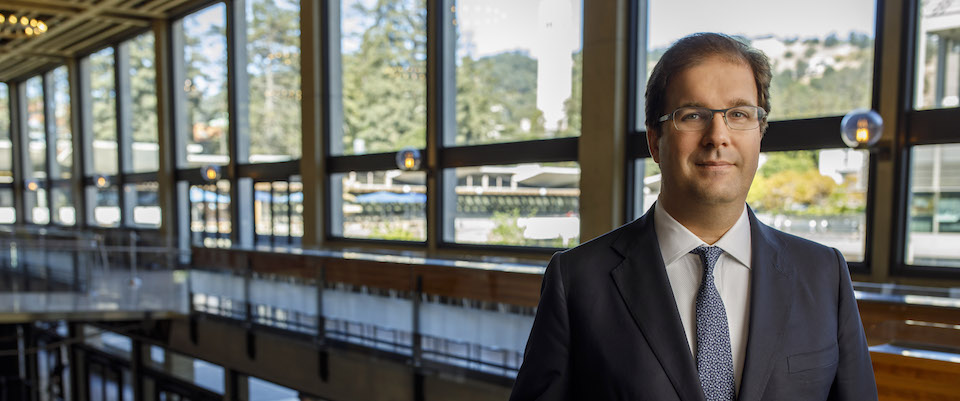The Vienna Philharmonic’s thrilling residency.
The very mention of the Vienna Philharmonic makes many music lovers’ hearts beat faster. It’s the orchestra that Gustav Mahler conducted for three years. It premiered Brahms’s Second Symphony, and created the sound that Leonard Bernstein crafted into some of his finest Mahler recordings. The orchestra’s silken strings; unique Viennese woodwinds, brass, and percussion; familial relationship with the Vienna Court Opera; democratic self-administration; and, since 1933, preference for guest conductors over a single music director—all put it in a class by itself.
Although any performance by the Vienna Philharmonic is an event in and of itself, the group’s February Cal Performances visit, conducted by Semyon Bychkov, will be no wow-and-bow one-nighter. For the first time in the history of Cal Performances, a world-renowned orchestra will remain in residence. On February 25–27, the Vienna Philharmonic will present three different evening concerts, a late-morning chamber music recital, and a host of master classes to students.
The Vienna Philharmonic’s stay is just one of the ambitious initiatives of new Cal Performances Director Matìas Tarnopolsky. All are designed to increase accessibility to and appreciation for the fine arts among students, faculty, and community. One of Tarnopolsky’s goals is to double student attendance at Cal Performances events from its current 7 percent to 14 percent.
“I feel like Cal Performances has a real responsibility to show the student community how fundamental and transformative the performing arts can be,” he explained by phone. “It’s of fundamental importance for me to make sure that as many students as want to attend, and [to] reach those who haven’t discovered yet what a wonderful part of their lives the performing arts can be.”
When Tarnopolsky first arrived on campus in fall 2009, he envisioned developing a single planned performance by the Vienna Philharmonic into the first of what he hopes will become an annual series of orchestral residencies. “I asked if they would come for three performances rather than one,” he says, “and they were thrilled. They very much like the idea of being here for more than one day. Artists especially enjoy being in this artistic/intellectual environment. It’s really incredible, the depth and breadth being on the campus can give to programming for the artists and audience alike.”
Tarnopolsky was 17 when he first heard the Vienna Philharmonic at the BBC Proms in London. Leonard Bernstein was conducting Mozart’s Clarinet Concerto and Mahler’s Fifth Symphony. To the young clarinet student, the performance was a revelation. “It was absolutely unforgettable,” he recalls. “I queued for standing room at 7 a.m., and I was in the fourth row by the time the performance started. I remember thinking, ‘This is just unbelievable.’ It was really one of those transformative moments that can make you pause, engage you totally, and change your life. I want to bring here that same sense of wonder and amazement at hearing a magnificent orchestra.”
Class Act
One vital component of the residency will be the six 90-minute master classes. Taught by six different members of the Vienna Philharmonic—two string players, two from the woodwinds section, and two from the brass—the classes will likely take place in music department buildings and possibly Zellerbach Hall. “I imagine there will be three or four students per class, with classes open to the public,” Tarnopolsky says. “This presents a unique opportunity for young musicians at Berkeley to have a lesson with world-class musicians.”
Lest you think the visit will work the great orchestra’s players ragged, Tarnopolsky has ensured that they will also get a taste of the lovely Northern California countryside. On February 24, the day after the players arrive in Berkeley, they’ll spend the morning touring the Napa Valley.
Professor Nicholas Mathew, whose specialty is Viennese music of the 18th and 19th centuries, shares Tarnopolsky’s enthusiasm about the orchestra. “It’s so unusual to have such an extravagant outfit come to your doorstep,” he says. “The Vienna Philharmonic’s string instruments, which produce one of the most famous sounds, are owned by the orchestra, not by the individual players. There are certain very distinctive details about the wind instruments, particularly the Viennese oboe, which produce a different timbre and require different fingering. When they visit, you hear the actual materials that have made this sound for well over a century.”
Mathew expects that many people who come to hear the Vienna Philharmonic’s Mahler will have also heard Mahler played by the San Francisco Symphony. “They’ll get to hear another version of Mahler’s Sixth Symphony from the city in which Mahler worked, and from the orchestra he conducted,” he says. “They’ll also hear Brahms’s Second, which the Vienna Philharmonic premiered under Hans Richter in 1877. The orchestra has some kind of claim to this repertoire, and a proprietarial conception of what it should sound like.”
Kathy Henschel, a founding trustee of Cal Performances and former Chairwoman of the Board, notes that the orchestra brings Mahler’s Sixth to Berkeley right after performing it in their famed hall, Vienna’s Musikverein. “To think of having that same concert onstage in Berkeley makes me shiver with anticipation,” she says. “It’s tremendous to be able to bring such a wonderful history to Berkeley. I can think of no other orchestra that has visited our campus that approaches the stature of the Vienna Philharmonic. Matias’s vision of having them in residence makes such a difference.”
Speaking by phone from France, Bychkov further underscored the orchestra’s special relationship with Mahler. “A couple of years ago, when I was rehearsing Mahler’s Third Symphony with them, I suddenly said to myself, ‘The way they phrase it is really a dialect. It is not just the German language; it is a Vienna dialect of German language.’ It was so appropriate and authentic for speaking the language of Mahler, because of who he was and where his music was born,” Bychkov explained. “It’s like the way an American plays Gershwin. This is more than ‘versatility’; there is a spiritual authenticity to the way in which the language and dialect are spoken.”
Bychkov also extolled how the orchestra maintains tradition across decades and centuries. “The Vienna Philharmonic is one of very few orchestras in the world that still rejuvenates itself by the younger ones coming from the same roots. It is still absolutely normal for a son to join his father in the orchestra; a few of them go back several generations. So there is a continuity that once existed in other orchestras. In Philadelphia, for example, they all came out of Curtis. In the Leningrad Philharmonic under Mravinsky, everyone more or less came from the same school in the same city.”
Whether Tarnopolsky’s vision will transform Berkeley into the school that produces the next generation of great orchestral players remains to be seen. What is certain is that at a time when appreciation of the centrality of the fine arts to the health and vibrancy of our civilization is on the decline, the arts are on the ascendant at Berkeley.




















